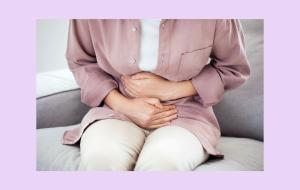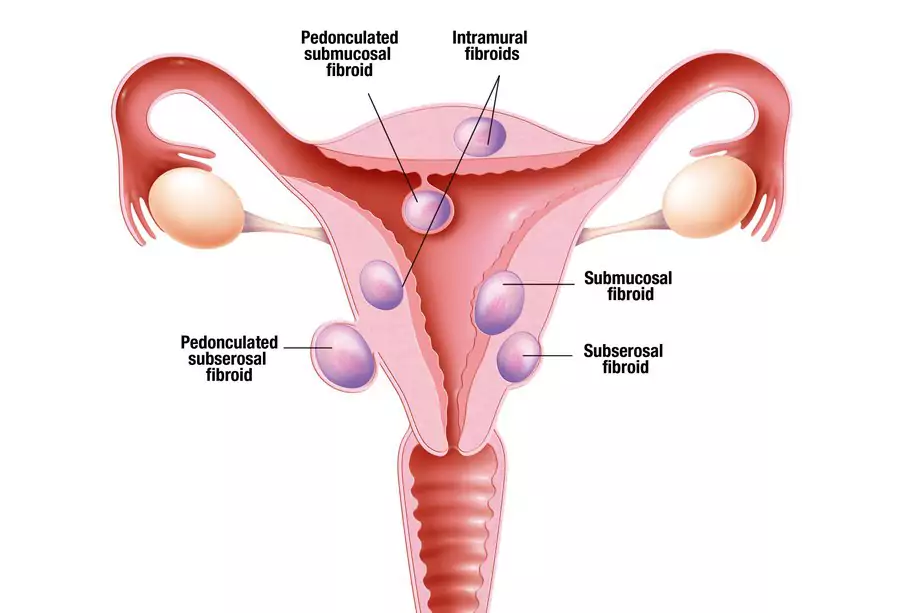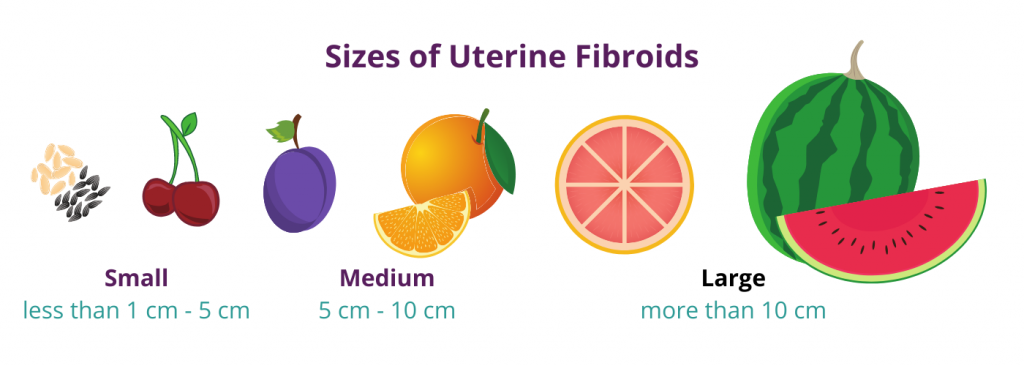
UNDERSTANDING UTERINE FIBROID RISK FACTORS
While these are not direct known causes of uterine fibroids, the following risk factors can help determine whether or not a woman is at risk:
- Age: As a woman ages, it’s more common for her to be diagnosed with uterine fibroids; especially from the age of 30 all the way to menopause. As mentioned above, there is a possibility fibroids can shrink after menopause.
- Family History: If a family member of a woman has uterine fibroids, it’s likely they are at risk for fibroids as well. In fact, if a woman’s mother had fibroids, she is three times more likely to get them herself.
- Ethnicity: Those of African-American descent are more likely to develop uterine fibroids than any other ethnicity. African-American women also have fibroids developing at earlier ages, grow larger, and have far more severe uterine fibroid symptoms.6
- Obesity: Overweight women are more likely to have uterine fibroids. The risk is two to three times higher in extremely obese women than in the general population.
- Lifestyle Factors: Birth control use, vitamin D deficiency, alcohol consumption, or consuming a diet high in saturated fat or inflammatory foods can all lead to the possibility of uterine fibroids.
There is no exact science behind fibroids, scientists only know what current research and data provide. While some of these risk factors are avoidable, others are not. It can make it quite difficult to determine whether or not one has uterine fibroids, until the uterine fibroid symptoms show up.
It explains exactly why women should watch their bodies and go to professionals when something abnormal is happening in one’s body.
What Are Uterine Fibroids?
What are fibroids? They are also known as leiomyomas or myomas, but uterine fibroids are their most common name. These tumors tend to be the most prevalent growth in a woman’s pelvic region.²
Uterine fibroids are muscular tumors that grow in the wall of the uterus (womb). The shapes, sizes, and locations of uterine fibroids depend on the woman, though most are round in form and located on or in the uterus.
Uterine fibroids can range from the size of a tiny seed to the largest, weighing more than 20 pounds. It often leads to questions such as: “Are uterine fibroids dangerous?” Many people even believe fibroid tumors are viruses or infections due to the symptoms which is why we advocate for screenings to determine the root cause of those symptoms.
Some may hear the word “tumor” and immediately think the condition is cancerous. But uterine fibroids are, for the most part, benign, which means uterine fibroids are noncancerous. The presence of uterine fibroids does not raise the likelihood of having a cancerous fibroid, nor does it not increase a woman’s chances of developing other types of uterine cancer.
However, there is a rare chance (less than one in 1,000) that a cancerous fibroid will appear; this is called leiomyosarcoma.
What are the Different Types of Uterine Fibroids?
- Intramural Fibroids develop within the uterine muscle walls. Heavy periods, unpredictable bleeding, and pelvic or lower back pain are common uterine fibroid symptoms.
- Subserosal Fibroids: This type grows outside the uterus and bulges into the pelvic or abdominal cavity. These uterine fibroid symptoms usually affect the adjacent organs, such as the bladder and bowels.
- Submucosal Fibroids: These appear in the endometrium, the uterus’s inner lining. It can result in excessive monthly bleeding, anemia, pelvic and back pain, and substantial menstrual clots.
- Pedunculated Fibroids: A peduncle, or stalk, connects this kind to the uterine wall. It can grow inside or outside of the uterus. Uterine fibroid symptoms resulting from these types of tumors are determined according to their location.
- Calcified Fibroids: These can arise once a fibroid has exceeded its blood supply and has degenerated. Calcium deposits frequently form on top of the residual fibroid tissue. Uterine fibroid symptoms, such as frequent urination, constipation, and stomach pain or pressure, may occur.
ARE UTERINE FIBROIDS COMMON?
According to the FDA, uterine fibroids are the most common benign tumor found in women of childbearing age.3 According to OWH, 20% to 80% of women can be affected by uterine fibroid symptoms and develop uterine fibroids by age 50.
However, although fibroids can shrink in size by themselves after menopause,4 they can still cause pain and bleeding. Menopause should not stop people from looking into uterine fibroid treatments, such as UFE procedure.
WHAT SIZE OF UTERINE FIBROID IS CONSIDERED DANGEROUS?
If large uterine fibroids (those larger than 10 cm or 4 inches) go untreated, they might grow even larger and rupture or degenerate. Large uterine fibroids can distort the structure of your uterus and harm adjacent organs such as your bladder and bowel. Large uterine fibroids can affect fertility in some situations.
WHAT DOES IT FEEL LIKE TO HAVE FIBROIDS?
- Pain is a general symptom of uterine fibroids. There are varying pain levels and pressures on the body that uterine fibroids can cause.
- Uncomfortable pressure on the uterus and stomach is one of the many symptoms of uterine fibroids that a woman can feel; it can be painful, but it doesn’t necessarily have to be.
- Uterine fibroids have more painful symptoms that can bother a woman’s lifestyle.

PELVIC PAIN
Described as a dull pressure in the pelvic region of one’s body5. It can often feel like cramps or pressure anywhere in that region, which makes it uncomfortable to perform normal activities, such as sitting, walking, running, or even just lying down due to the symptoms of uterine fibroids. It’s very synonymous with period cramps.
LOWER BACK PAIN
If the uterine fibroids grow large enough, they can often put pressure against the uterus, which in turn – can put pressure on the back and spine. There is also a possibility that the pressure can affect other organs as symptoms of uterine fibroids.
ABDOMINAL PRESSURE
If the uterine fibroids are large enough, they can place pressure or the feeling of fullness on the abdomen.
As a symptom of uterine fibroids, abdominal pressure can be considered fairly normal; however, any sharp pains in the abdomen are a cause for concern and should be checked by a physician.
PAIN DURING INTERCOURSE
While it is completely possible to have pain during sex without uterine fibroids, having pain during intercourse is also a symptom. Therefore it’s important to speak to a doctor or healthcare provider if this and other symptoms appear during intercourse.
RECTAL AND BLADDER PRESSURE
Having the need to use the bathroom frequently can also be a sign of discomfort and is caused by the uterus and uterine fibroids growing to the point in which they press against the bladder and rectum.
This often causes frequent urination or feeling like you can never empty the bladder fully. It can also cause problems with bowel movements, like constipation or painful straining.
WHAT SIZE OF UTERINE FIBROIDS ARE DANGEROUS?
Large and medium-sized uterine fibroids can cause an increased abdominal area, frequent urination, trouble emptying the bladder, or constipation, and can impact neighboring organs.
WHAT ARE THE SYMPTOMS?
The symptoms of uterine fibroids vary per person, and some women may be asymptomatic. If you feel like anything may to start affecting your daily life, it is important to consult with a doctor or fibroid specialist to determine if fibroids could be a factor.
Symptoms associated with Uterine Fibroids:
- Heavy and prolonged menstruation between or during your periods
- Anemia, which can lead to fatigue
- Pain during intercourse
- Frequent urination
- Constipation and/or bloating
- Pain in your pelvis or lower back
- Increased menstrual cramping
- Stomach swelling
- Reproductive issues, possibly resulting in infertility
- Pregnancy complications, which may cause a more painful delivery or C-section
If you are unsure whether you have uterine fibroid symptoms, you can use symptom quiz, which can give you guidance. It should not, however, take the place of visiting a professional.
WHAT CAUSES FIBROIDS?
According to the government, through OASH, no one knows for sure what causes uterine fibroids, though there are a few risk factors to consider. There are also a few factors that could play a role that’s in the body of everyone:
- Hormones: Fibroids often appear when hormone levels are off, as they’re usually under hormonal control: both estrogen and progesterone. It’s noted that they often grow during pregnancy, aka when hormone levels are higher than usual; and shrink when anti-hormone medication (birth control, for example, though it doesn’t always work) is used. They also have the potential to shrink or stop growing once a woman reaches menopause.
- Genetics: If it runs in your family, it’s likely you’ve got the gene for it to run in you, as well.
Because scientists don’t confidently know what causes uterine fibroids, this also means we don’t know what causes them to shrink or grow. More research is to be done on the matter as we continue to learn and participate in studies.
TREATMENT

DIAGNOSIS
If you suspect you have uterine fibroids, you may be wondering what steps to take next. The first step is to obtain a proper medical diagnosis. This is critical since many other illnesses exhibit uterine fibroid symptoms that are similar. Some of these are potentially fatal.
Doctors employ a variety of approaches to detect fibroid tumors of all sizes and types.
- Pelvic exam: Doctors can often detect an enlarged or deformed uterus, which may indicate the existence of uterine fibroids during a routine examination.
- Ultrasound: If fibroids are suspected, this is frequently the first – and occasionally the only – imaging test that is requested.
- MRI: This thorough imaging test allows your medical physician to see the size, number, and location of fibroids when more information is needed.
- Hyster sonography: This procedure, also known as saline infusion ultrasonography, can be performed to dilate the uterine cavity and provide a better look within.
- Hysteroscopy: This surgical method is used less frequently to see directly into the uterine cavity.
Finding the best uterine fibroid treatments for uterine fibroids may be surprisingly simple (UFE procedure, aka fibroid embolization), especially if you choose to avoid the risks of major surgery and its lengthy recovery.
We recommend consulting a fibroid specialist in addition to discussing uterine fibroid symptoms and a diagnosis with your doctor to understand the entire range of uterine fibroids treatment options, such as the UFE procedure (fibroid embolization).
Treatment for Fibroid Risk Factors
There are multiple options for uterine fibroid treatments, some more invasive than others.
- Uterine Fibroid Embolization (UFE): UFE procedures (fibroid embolization) are an outpatient operation that inserts embolic materials through a small catheter implanted in the wrist or groin to obstruct blood flow and cause the fibroid to shrink and die. USA Fibroid Centers is a leader in UFE.
- Hysterectomy: The uterus and sometimes the ovaries are completely removed, which avoids future fibroids but renders the lady sterile and has potential complications.
- Myomectomy: This is the removal of fibroids using abdominal incisions or a scope introduced into the cervix.
- Ablation: Heat is used to eliminate the fibroids in this technique, with incisions made in the abdomen for the device to be placed to release heat in the uterus.
- Acessa: This is a sort of ablation that employs heat from the Acessa device to burn the fibroid.
USA FIBROID CENTERS IS HERE TO HELP
The main goal and purpose at USA Fibroids Centers is to help you get back to living life to the fullest without having to deal with debilitating symptoms. Our focus and expertise is in the non surgical procedure, Uterine Fibroid Embolozation(UFE). This procedure has the benefit of an outpatient environment – allowing you to go home the same day. UFE also preserves fertility for women wishing to get pregnant. Another benefit is less risk for infection and other complications and requires no general anesthesia. The recovery is much shorter than alternatives of one to two weeks.
Schedule an appointment with a fibroid expert at USA Fibroid Centers today to learn more about uterine fibroid treatments without surgery.
For your convenience, we offer experienced interventional radiologists at all of our locations across the USA.
Most major insurance programs cover UFE. If you believe you may have fibroids, please call us at 855.615.2555 to discuss your symptoms and treatment options.
-
https://www.womenshealth.gov/a-z-topics/uterine-fibroids
-
https://www.acog.org/womens-health/faqs/uterine-fibroids
-
https://www.fda.gov/consumers/womens-health-topics/uterine-fibroids
-
https://www.medicalnewstoday.com/articles/151405#types
-
https://www.health.com/condition/reproductive-health/uterine-fibroid-pain
-
https://www.nichd.nih.gov/health/topics/uterine/conditioninfo/people-affected





